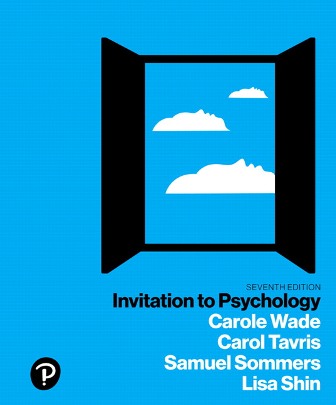Test Bank for Invitation to Psychology, 7th Edition, Carole Wade, Carol Tavris Samuel R Sommers Lisa M. Shin
$55.00 Original price was: $55.00.$29.99Current price is: $29.99.
Test Bank for Invitation to Psychology, 7th Edition, Carole Wade, Carol Tavris, Samuel R Sommers, Lisa M. Shin
This is completed downloadable of Test Bank for Invitation to Psychology, 7th Edition, Carole Wade, Carol Tavris, Samuel R Sommers, Lisa M. Shin

Product Details:
- ISBN-10 : 0134550102
- ISBN-13 : 978-0134550107
- Author: Carole Wade, Carol Tavris, Samuel R Sommers, Lisa M. Shin
Invitation to Psychology, 7th Edition weaves scientific thinking and critical thinking into the fabric of psychological science. Joining longtime authors Carole Wade and Carol Tavris, new co-authors Samuel Sommers and Lisa Shin (of Tufts University) call upon their research and teaching expertise to speak to today’s students. Their contributions include expanded gender coverage as well as engaging new cultural and pop-cultural examples. By prompting students to separate fact from fiction and to distinguish wishful thinking from thinking wisely, the authors inspire students to ask questions and be willing to wonder ― and help them become 21st-century thinkers.
Table of Content:
- Chapter 1 What Is Psychology?
- Learning Objectives
- Ask questions … be willing to wonder
- 1.1 Psychology, Pseudoscience, and Popular Opinion
- What Psychology Is and Is Not
- The Birth of Modern Psychology
- Major Perspectives in Psychology
- What Psychologists Do
- Quiz for Module 1.1
- 1.2 Thinking Critically and Scientifically About Psychology
- What Is Critical Thinking?
- Ask Questions; Be Willing to Wonder
- Define Your Terms
- Examine the Evidence
- Analyze Assumptions and Biases
- Avoid Emotional Reasoning
- Don’t Oversimplify
- Consider Other Interpretations
- Tolerate Uncertainty
- Using Psychology to Study Psychology
- Quiz for Module 1.2
- 1.3 Doing Research: Moving From Questions to Data
- Finding a Sample
- Descriptive Studies: Establishing the Facts
- Quiz for Module 1.3
- 1.4 Correlational Studies: Looking for Relationships
- Measuring Correlations
- Cautions About Correlations
- Quiz for Module 1.4
- 1.5 The Experiment: Hunting for Causes
- Experimental Variables
- Experimental Conditions
- Advantages and Limitations of Experiments
- Quiz for Module 1.5
- 1.6 Evaluating the Findings
- Describing the Data
- Interpreting the Data
- Quiz for Module 1.6
- Summary
- 1.1 Psychology, Pseudoscience, and Popular Opinion
- 1.2 Thinking Critically and Scientifically About Psychology
- 1.3 Doing Research: Moving From Questions to Data
- 1.4 Correlational Studies: Looking for Relationships
- 1.5 The Experiment: Hunting for Causes
- 1.6 Evaluating the Findings
- Chapter 1 Quiz
- Chapter 2 Neurons, Hormones, and the Brain
- Learning Objectives
- Ask questions … be willing to wonder
- 2.1 The Nervous System: A Basic Blueprint
- The Central Nervous System
- The Peripheral Nervous System
- Quiz for Module 2.1
- 2.2 Communication in the Nervous System
- Types of Cells
- The Structure of the Neuron
- Neurogenesis: The Birth of Neurons
- How Neurons Communicate
- Chemical Messengers in the Nervous System
- Neurotransmitters: Versatile Couriers
- Hormones: Long-Distance Messengers
- Neuromodulators: The Brain’s Volume Control
- Quiz for Module 2.2
- 2.3 Mapping the Brain
- Manipulating the Brain and Observing Behavior
- Manipulating Behavior and Observing the Brain
- Controversies and Cautions
- Quiz for Module 2.3
- 2.4 A Tour Through the Brain
- The Brain Stem and Cerebellum
- The Thalamus
- The Hypothalamus and the Pituitary Gland
- The Amygdala
- The Hippocampus
- The Cerebrum
- The Cerebral Cortex
- Lobes of the Cortex
- The Prefrontal Cortex
- Quiz for Module 2.4
- 2.5 The Two Hemispheres of the Brain
- Split Brains: A House Divided
- The Two Hemispheres: Allies or Opposites?
- Quiz for Module 2.5
- 2.6 The Flexible Brain
- Experience and the Brain
- Culture and the Brain
- Are There “His” and “Hers” Brains?
- Quiz for Module 2.6
- Summary
- 2.1 The Nervous System: A Basic Blueprint
- 2.2 Communication in the Nervous System
- 2.3 Mapping the Brain
- 2.4 A Tour Through the Brain
- 2.5 The Two Hemispheres of the Brain
- 2.6 The Flexible Brain
- Chapter 2 Quiz
- Chapter 3 Sensation and Perception
- Learning Objectives
- Ask questions . . . be willing to wonder
- 3.1 Our Sensational Senses
- The Riddle of Separate Sensations
- Measuring the Senses
- Absolute Threshold
- Difference Threshold
- Signal-Detection Theory
- Sensory Adaptation
- Sensing without Perceiving
- Quiz for Module 3.1
- 3.2 Vision
- What We See
- An Eye on the World
- Why the Visual System Is Not a Camera
- How We See Colors
- The Trichromatic Theory
- The Opponent-Process Theory
- Constructing the Visual World
- Form Perception
- Depth and Distance Perception
- Visual Constancies: When Seeing Is Believing
- Visual Illusions: When Seeing is Misleading
- Quiz for Module 3.2
- 3.3 Hearing
- What We Hear
- An Ear on the World
- Constructing the Auditory World
- Quiz for Module 3.3
- 3.4 Other Senses
- Taste: Savory Sensations
- Smell: The Sense of Scents
- Senses of the Skin
- The Mystery of Pain
- The Environment Within
- Quiz for Module 3.4
- Summary
- 3.1 Our Sensational Senses
- 3.2 Vision
- 3.3 Hearing
- 3.4 Other Senses
- Chapter 3 Quiz
- Chapter 4 Consciousness and Sleep
- Learning Objectives
- Ask questions … be willing to wonder
- 4.1 Biological Rhythms: The Tides of Experience
- Circadian Rhythms
- The Body’s Clock
- When the Clock is Out of SYNC
- Moods and Long-Term Rhythms
- Does the Season Affect Moods?
- Does the Menstrual Cycle Affect Moods?
- Quiz for Module 4.1
- 4.2 The Rhythms of Sleep
- The Realms of Sleep
- Why We Sleep
- The Mental Consequences of Sleep Loss
- The Mental Benefits of Sleep
- Quiz for Module 4.2
- 4.3 Exploring the Dream World
- Explanations of Dreaming
- Dreams as Efforts to Deal with Problems
- Dreams as Thinking
- Dreams as Interpreted Brain Activity
- Evaluating Dream Theories
- Quiz for Module 4.3
- 4.4 The Riddle of Hypnosis
- True or False?
- Answers:
- The Nature of Hypnosis
- Theories of Hypnosis
- Dissociation Theories
- Sociocognitive Theories
- Biological Theories
- Quiz for Module 4.4
- 4.5 Consciousness-Altering Drugs
- Classifying Drugs
- The Physiology of Drug Effects
- The Psychology of Drug Effects
- Quiz for Module 4.5
- Summary
- 4.1 Biological Rhythms: The Tides of Experience
- 4.2 The Rhythms of Sleep
- 4.3 Exploring the Dream World
- 4.4 The Riddle of Hypnosis
- 4.5 Consciousness-Altering Drugs
- Chapter 4 Quiz
- Chapter 5 Learning
- Learning Objectives
- Ask questions . . . be willing to wonder
- 5.1 Classical Conditioning
- New Reflexes from Old
- Principles of Classical Conditioning
- Extinction
- Higher-Order Conditioning
- Stimulus Generalization and Discrimination
- What Is Actually Learned in Classical Conditioning?
- Quiz for Module 5.1
- 5.2 Classical Conditioning in Real Life
- Learning to Like
- Learning to Fear
- Accounting for Taste
- Reacting to Medical Treatments
- Quiz for Module 5.2
- 5.3 Operant Conditioning
- The Birth of Radical Behaviorism
- The Consequences of Behavior
- Primary and Secondary Reinforcers and Punishers
- Positive and Negative Reinforcers and Punishers
- Quiz for Module 5.3
- 5.4 Principles of Operant Conditioning
- The Importance of Responses
- Extinction
- Stimulus Generalization and Discrimination
- Learning on Schedule
- Shaping
- Biological Limits on Learning
- Skinner: The Man and the Myth
- Quiz for Module 5.4
- 5.5 Operant Conditioning in Real Life
- The Pros and Cons of Punishment
- When Punishment Works
- When Punishment Fails
- The Problems With Reward
- Misuse of Rewards
- Why Rewards Can Backfire
- Quiz for Module 5.5
- 5.6 Learning and the Mind
- Latent Learning
- Social-Cognitive Learning Theories
- Learning by Observing
- Bandura’s Classic Research
- Quiz for Module 5.6
- Summary
- 5.1 Classical Conditioning
- 5.2 Classical Conditioning in Real Life
- 5.3 Operant Conditioning
- 5.4 Principles of Operant Conditioning
- 5.5 Operant Conditioning in Real Life
- 5.6 Learning and the Mind
- Chapter 5 Quiz
- Chapter 6 Memory
- Learning Objectives
- Ask questions . . . be willing to wonder
- 6.1 In Pursuit of Memory
- Measuring Memory
- Models of Memory
- Quiz for Module 6.1
- 6.2 The Three-Box Model of Memory
- The Sensory Register: Fleeting Impressions
- Working Memory: Memory’s Notepad
- Long-Term Memory: Memory’s Storage System
- Organization in Long-Term Memory
- The Contents of Long-Term Memory
- From Working Memory to Long-Term Memory: A Puzzle
- Quiz for Module 6.2
- 6.3 The Biology of Memory
- Changes in Neurons and Synapses
- Where Memories Are Made
- Hormones, Emotion, and Memory
- Quiz for Module 6.3
- 6.4 How We Remember
- Encoding, Rehearsal, and Retrieval
- Effective Encoding
- Rehearsal
- Retrieval Practice
- Quiz for Module 6.4
- 6.5 Why We Forget
- Mechanisms of Forgetting
- Decay
- Replacement
- Interference
- Cue-Dependent Forgetting
- Childhood Amnesia: The Missing Years
- The Repression Controversy
- Quiz for Module 6.5
- 6.6 Reconstructing the Past
- The Manufacture of Memory
- The Conditions of Confabulation
- The Eyewitness on Trial
- Quiz for Module 6.6
- Summary
- 6.1 In Pursuit of Memory
- 6.2 The Three-Box Model of Memory
- 6.3 The Biology of Memory
- 6.4 How We Remember
- 6.5 Why We Forget
- 6.6 Reconstructing the Past
- Chapter 6 Quiz
- Chapter 7 Thinking and Intelligence
- Learning Objectives
- Ask questions … be willing to wonder
- 7.1 Thought: Using What We Know
- The Elements of Cognition
- How Conscious Is Thought?
- Subconscious Thinking
- Nonconscious Thinking
- Problem Solving and Decision Making
- Reasoning Rationally
- Quiz for Module 7.1
- 7.2 Barriers to Reasoning Rationally
- Exaggerating the Improbable
- Avoiding Loss
- Biases and Mental Sets
- The Fairness Bias
- The Hindsight Bias
- The Confirmation Bias
- Mental Sets
- Overcoming Our Cognitive Biases
- Quiz for Module 7.2
- 7.3 Measuring Intelligence
- Measuring the Invisible
- The IQ Test
- Binet’s Brainstorm
- The IQ Test Comes to America
- Culture and Intelligence Testing
- Elements of Intelligence
- The Triarchic Theory
- Multiple Intelligences
- Emotional Intelligence
- Motivation, Hard Work, and Intellectual Success
- Quiz for Module 7.3
- 7.4 Animal Minds
- Animal Intelligence
- Animals and Language
- Thinking About the Thinking of Animals
- Quiz for Module 7.4
- Summary
- 7.1 Thought: Using What We Know
- 7.2 Barriers to Reasoning Rationally
- 7.3 Measuring Intelligence
- 7.4 Animal Minds
- Chapter 7 Quiz
- Chapter 8 The Major Motives of Life: Food, Love, Sex, and Work
- Learning Objectives
- Ask questions … be willing to wonder
- 8.1 Motivation and the Hungry Animal
- Defining Motivation
- The Biology of Weight
- Genetic Influences on Weight and Body Shape
- Gene Mutations and Leptin
- Other Factors in Obesity
- Environmental Influences on Weight
- The Body as Battleground: Eating Disorders
- Quiz for Module 8.1
- 8.2 The Social Animal: Motives to Love
- The Biology of Love
- Where Does Love Begin?
- The Role of Endorphins
- The Psychology of Love
- The Attachment Theory of Love
- The Ingredients of Love
- Gender, Culture, and Love
- Quiz for Module 8.2
- 8.3 The Erotic Animal: Motives for Sex
- The Biology of Desire
- Factors Promoting Sexual Desire
- Men and Women: Same or Different?
- Biology and Sexual Orientation
- The Psychology of Desire
- The Many Motives for Sex
- Sexual Coercion and Rape
- Gender, Culture, and Sex
- Quiz for Module 8.3
- 8.4 The Competent Animal: Motives to Achieve
- The Effects of Motivation on Work
- The Importance of Goals
- Expectations and Self-Efficacy
- The Effects of Work on Motivation
- Working Conditions
- Needs, Motives, and the Pursuit of Happiness
- Quiz for Module 8.4
- Summary
- 8.1 Motivation and the Hungry Animal
- 8.2 The Social Animal: Motives to Love
- 8.3 The Erotic Animal: Motives for Sex
- 8.4 The Competent Animal: Motives to Achieve
- Chapter 8Quiz
- Chapter 9 Emotion, Stress, and Health
- Learning Objectives
- Ask questions … be willing to wonder
- 9.1 The Nature of Emotion
- Emotion and the Face
- The Functions of Facial Expressions
- Facial Expressions in Context
- Emotion and the Brain
- Neurons for Imitation and Empathy
- The Energy of Emotion
- Emotion and the Mind
- Quiz for Module 9.1
- 9.2 Emotion and Culture
- How Culture Shapes Emotions
- Communicating Emotions
- Gender and Emotion
- Quiz for Module 9.2
- 9.3 The Nature of Stress
- Stress and the Body
- Current Approaches
- The Immune System
- Stress and the Mind
- Optimism
- Conscientiousness and Control
- Quiz for Module 9.3
- 9.4 Stress and Emotion
- Hostility and Depression: Do They Hurt?
- Positive Emotions: Do They Help?
- Emotional Inhibition and Expression
- The Benefits of Confession
- The Benefits of Letting Grievances Go
- Quiz for Module 9.4
- 9.5 Coping with Stress
- Solving the Problem
- Rethinking the Problem
- Drawing on Social Support
- When Friends Help You Cope …
- … And When You Have to Cope with Friends
- Quiz for Module 9.5
- Summary
- 9.1 The Nature of Emotion
- 9.2 Emotion and Culture
- 9.3 The Nature of Stress
- 9.4 Stress and Emotion
- 9.5 Coping With Stress
- Chapter 9 Quiz
- Chapter 10 Development Over the Lifespan
- Learning Objectives
- Ask questions . . . be willing to wonder
- 10.1 From Conception Through the First Year
- Prenatal Development
- The Infant’s World
- Attachment
- Separation and Security
- What Determines Attachment Style?
- Quiz for Module 10.1
- 10.2 Cognitive Development
- Thinking
- Piaget’s Theory of Cognitive Stages
- Current Views of Cognitive Development
- Language
- Language: Built in or Learned?
- From Cooing to Communicating
- Quiz for Module 10.2
- 10.3 Moral Development
- Stages of Morality
- Getting Children to Be Good
- Self-Control and Conscience
- Quiz for Module 10.3
- 10.4 Gender Development
- Gender Identity
- Influences on Gender Development
- Biological Influences
- Cognitive Influences
- Learning Influences
- Quiz for Module 10.4
- 10.5 Adolescence
- The Physiology of Adolescence
- The Psychology of Adolescence
- Quiz for Module 10.5
- 10.6 Adulthood
- Stages and Ages
- The Transitions of Life
- Emerging Adulthood
- The Middle Years
- Old Age
- Quiz for Module 10.6
- Summary
- 10.1 From Conception Through the First Year
- 10.2 Cognitive Development
- 10.3 Moral Development
- 10.4 Gender Development
- 10.5 Adolescence
- 10.6 Adulthood
- Chapter 10 Quiz
- Chapter 11 Social Psychology
- Learning Objectives
- Ask questions . . . be willing to wonder
- 11.1 Social Forces
- Rules and Roles
- The Obedience Study
- The Prison Study
- Why People Obey
- Quiz for Module 11.1
- 11.2 Social Beliefs
- Attributions
- Attitudes
- Cognitive Dissonance
- Persuasion or “Brainwashing”? The Case of Suicide Bombers
- Quiz for Module 11.2
- 11.3 Individuals in Groups
- Conformity
- Groupthink
- The Bystander Effect
- Deindividuation
- Altruism and Dissent
- Quiz for Module 11.3
- 11.4 Us Versus Them: Group Identity and Conflict
- Social Identity
- In-groups and Out-groups
- Stereotypes
- Quiz for Module 11.4
- 11.5 Prejudice
- The Origins of Prejudice
- Measuring Prejudice
- Reducing Conflict and Prejudice
- Quiz for Module 11.5
- Summary
- 11.1 Rules and Roles
- 11.2 Social Beliefs
- 11.3 Individuals in Groups
- 11.4 Us versus Them: Group Identity
- 11.5 Prejudice
- Chapter 11 Quiz
- Chapter 12 Theories of Personality
- Learning Objectives
- Ask questions . . . be willing to wonder
- 12.1 Psychodynamic Theories of Personality
- Freud and Psychoanalysis
- The Structure of Personality
- Defense Mechanisms
- The Development of Personality
- Freud in Perspective
- Other Psychodynamic Approaches
- Evaluating Psychodynamic Theories
- Quiz for Module 12.1
- 12.2 The Modern Study of Personality
- Popular Personality Tests
- Core Personality Traits
- Quiz for Module 12.2
- 12.3 Genetic Influences on Personality
- Heredity and Temperament
- Heredity and Traits
- Quiz for Module 12.3
- 12.4 Environmental Influences on Personality
- Situations and Social Learning
- Parental Influence—and Its Limits
- The Power of Peers
- Quiz for Module 12.4
- 12.5 Cultural Influences on Personality
- Culture, Values, and Traits
- Culture and the Self
- Culture and Traits
- Evaluating Cultural Approaches
- Quiz for Module 12.5
- 12.6 The Inner Experience
- Humanist Approaches
- Abraham Maslow
- Carl Rogers
- Rollo May
- Narrative Approaches
- Evaluating Humanist and Narrative Approaches
- Quiz for Module 12.6
- Summary
- 12.1 Psychodynamic Theories of Personality
- 12.2 The Modern Study of Personality
- 12.3 Genetic Influences on Personality
- 12.4 Environmental Influences on Personality
- 12.5 Cultural Influences on Personality
- 12.6 The Inner Experience
- Chapter 12 Quiz
- Chapter 13 Psychological Disorders
- Learning Objectives
- Ask questions … be willing to wonder
- 13.1 Diagnosing Mental Disorders
- Dilemmas of Definition
- Dilemmas of Diagnosis
- Classifying Disorders: The DSM
- Culture and Mental Illness
- Psychological Testing
- Self-report questionnaires
- Projective Tests
- Quiz for Module 13.1
- 13.2 Depressive and Bipolar Disorders
- Depression
- Bipolar Disorder
- Origins of Depression
- Quiz for Module 13.2
- 13.3 Anxiety Disorders
- Anxiety and Panic
- Panic Disorder
- Fears and Phobias
- Quiz for Module 13.3
- 13.4 Trauma and Obsessive–Compulsive Disorders
- Posttraumatic Stress Disorder
- Obsessions and Compulsions
- Quiz for Module 13.4
- 13.5 Personality Disorders
- Borderline Personality Disorder
- Antisocial Personality Disorder
- Psychopathy: Myths and Evidence
- Quiz for Module 13.5
- 13.6 Addictive Disorders
- Biology and Addiction
- Learning, Culture, and Addiction
- Quiz for Module 13.6
- 13.7 Dissociative Identity Disorder
- A Controversial Diagnosis
- Thinking Critically About DID
- Quiz for Module 13.7
- 13.8 Schizophrenia
- Symptoms of Schizophrenia
- Origins of Schizophrenia
- Quiz for Module 13.8
- Summary
- 13.1 Diagnosing Mental Disorders
- 13.2 Depressive and Bipolar Disorders
- 13.3 Anxiety Disorders
- 13.4 Trauma and Obsessive–Compulsive Disorders
- 13.5 Personality Disorders
- 13.6 Drug Abuse and Addiction
- 13.7 Dissociative Identity Disorder
- 13.8 Schizophrenia
- Chapter 13 Quiz
- Chapter 14 Approaches to Treatment
- Learning Objectives
- Ask questions … be willing to wonder
- 14.1 Biological Treatments for Mental Disorders
- The Question of Drugs
- Drugs Commonly Prescribed for Mental Disorders
- Some Cautions about Drug Treatments
- Direct Brain Intervention
- Quiz for Module 14.1
- 14.2 Major Schools of Psychotherapy
- Psychodynamic Therapy
- Behavior and Cognitive Therapy
- Behavioral Techniques
- Cognitive Techniques
- Humanist and Existential Therapy
- Family and Couples Therapy
- Quiz for Module 14.2
- 14.3 Evaluating Psychotherapy
- The Scientist–Practitioner Gap
- Problems in Assessing Therapy
- When Therapy Helps
- Special Problems and Populations
- Biology and Psychotherapy
- When Interventions Harm
- Culture and Psychotherapy
- Quiz for Module 14.3
- Summary
- 14.1 Biological Treatments for Mental Disorders
- 14.2 Major Schools of Psychotherapy
- 14.3 Evaluating Psychotherapy
- Chapter 14 Quiz
- Glossary
- References
- Name Index
- A
- B
- C
- D
- E
- F
- G
- H
- I
- J
- K
- L
- M
- N
- O
- P
- Q
- R
- S
- T
- U
- V
- W
- X
- Y
- Z
- Subject Index
- A
- B
- C
- D
- E
- F
- G
- H
- I
- J
- K
- L
- M
- N
- O
- P
- Q
- R
- S
- T
- U
- V
- W
- X
- Y
- Credits
- Photo Credits
- Chapter 1
- Chapter 2
- Chapter 3
- Chapter 4
- Chapter 5
- Chapter 6
- Chapter 7
- Chapter 8
- Chapter 9
- Chapter 10
- Chapter 11
- Chapter 12
- Chapter 13
- Chapter 14
- Text Credits
- Chapter 1
- Chapter 2
- Chapter 3
- Chapter 4
- Chapter 5
- Chapter 6
- Chapter 7
- Chapter 8
- Chapter 9
- Chapter 10
- Chapter 11
- Chapter 12
- Chapter 13
- Chapter 14
People Also Search:
invitation to psychology 7th edition
invitation to psychology 7th edition download scribd
invitation to psychology 7th edition test bank download pdf











